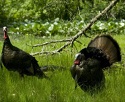 I didn’t know him. But when word came from my wife that a neighbor less than a mile up the road had been fatally shot, it was like a stiff punch to the gut. Another hunter had shot him when he thought he saw a turkey. What a horrible, senseless tragedy for the victim, his family and friends and the man who pulled the shotgun trigger. I still think of it off and on today, many years later, when I drive by the house where the hunter lived and picture his widow now living alone with just a cat and dog to comfort her.
I didn’t know him. But when word came from my wife that a neighbor less than a mile up the road had been fatally shot, it was like a stiff punch to the gut. Another hunter had shot him when he thought he saw a turkey. What a horrible, senseless tragedy for the victim, his family and friends and the man who pulled the shotgun trigger. I still think of it off and on today, many years later, when I drive by the house where the hunter lived and picture his widow now living alone with just a cat and dog to comfort her.
 |
| Never wear white, red or blue —
the colors of a tom — when turkey hunting. |
To prevent that tragic mistake from occurring again, all of us as hunters should carefully follow the rules of safe hunting when we head into the woods in search of a gobbler this spring. Sure, you’re more likely to be injured driving in a car, swimming or working around the house than hunting. But there are real risks.
The following ten hunting safety rules can bring those risks down to a bare minimum.
1. The main rule, which I’ll repeat again at the end, is to never aim at something and never pull the trigger unless you’re 100 percent sure it’s a real turkey.
2. Avoid crowded areas. If there are few or no other hunters around, the risks of an accident decline significantly. But don’t assume you’re all alone even in remote areas. Other hunters could be there. Even if you’re on private posted land, they could trespass and sneak in.
3. Sit with your back against a tree as wide as your body when you get ready to call in a bird. This will protect you from a hunter sneaking up from behind who might see the turkey you are calling.
4. Do not set up in thick brush. For one thing, turkeys don’t like to walk through thick cover and probably won’t come into range anyway. Also, there’s too much chance another hunter hearing your calls and seeing some slight movement might shoot.
5. Never wear red, white or blue colors in your clothing, even your socks or a t-shirt. These are the colors a gobbler’s head and neck take on when he’s lit up with the mating urge and trying to impress hens.
6. When hiking in to an area, moving between different locations, or walking out after the hunt, consider wearing a blaze orange hat or vest. If you bag a turkey, place it in an orange turkey tote bag or wrap an orange ribbon around it.
7. Avoid using a gobbler call unless you feel confident no other hunters are in the immediate area.
8. Never wave at another hunter to alert him or her to your presence. That subtle movement could appear like a turkey moving its feathers to a careless hunter. Rather, speak to the hunter in a loud, firm voice.
9. If you use a turkey decoy, try to set up so that a rise in terrain or open field behind the fake bird will prevent a hunter from sneaking up directly behind it.
10. Never shoot at sound or movement. Take your gun off its safe position only when you are 100 percent sure your target is a legal tom and there are no humans behind the bird. Always assume sound or movement could be another hunter until your eyes positively confirm that it’s a legal bird.
Certainly there are other rules for safe turkey hunting. But these offer a good starting point for all of us who venture out in quest of a wary gobbler this spring. If we all keep them in mind, spring turkey hunting could be a nearly accident-free sport.
![]() Read Turkey Hunting Tips: Hunting Rules and Tatics Part 1
Read Turkey Hunting Tips: Hunting Rules and Tatics Part 1
This article was written by Gerald Almy and appeared on Bass Pro Shops 1Source.
